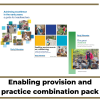Government urged to consider new funding options for early childhood education and care
A coalition of Early Years organisations convened by Kindred2 , including Early Education and providers such as LEYF and Ark Start, has identified a series
Government has today published its Schools White Paper “Opportunity for all”.
We welcome the fact that early years gets a few mentions:
However, the “key facts” only list the numbers of children in the school system, not the 1.5m in early years provision. There is mention of where children’s outcomes are improving, but no mention of the fact that the “disadvantage gap” at the end of Reception has been increasing since 2017. The reference to increasing the number of graduates in the sector has yet to be fleshed out, and follows a U-turn on a similar pledge in the last early years workforce strategy. The reference to a broad curriculum sits next to an emphasis on literacy and numeracy which could perhaps have been tempered by a recognition of the holistic nature of learning, especially in the early years.
Most starkly, the mention of “investing in the early years workforce” (in terms of CPD programmes) sits next to a mention of “£30,000 starting salaries to attract and retain the very best teachers”… but not in the early years. An early years teacher cannot expect parity of pay and conditions with their QTS colleagues, and funding pressures are making it harder for nursery and primary schools even to meet their statutory requirements for providing QTS teachers in their nursery provision. Meanwhile the government has done nothing to address the issues of average pay in the early years sector being well below the national minimum wage.
In this context claiming that “High-quality early years provision will ensure children have the best possible start to their education, building strong foundations for the rest of their time in school” as part of a pledge that “every child will be taught by an excellent teacher trained in the best evidenced approaches” rings a little hollow. The £180m of investment in early years CPD is welcome – but is unlikely to be transformative in the absence of strategy to increase the pay, conditions and status of practitioners to a level that attracts and keeps the best candidates.
Extending the “golden thread” of CPD to the early years workforce with an NPQ in early years leadership is a welcome start – but if practitioners do not see their pay rise when they achieve the qualification, they may question whether the government really does value a well-qualified early years workforce, and wonder whether the opportunities for career progression match the effort in achieving further qualifications. As we know, there are huge recruitment and retention challenges in the sector which are a much more pressing issue in the early years workforce pipeline.
Maintained nursery schools will be wondering again what their future is within a system where every other type of school is being pressured to academise, while maintained nursery schools are barred from doing so. Even if the law was changed to allow them to academise, they would face the further hurdle of having to demonstrate financial viability first – and with 1 in 4 being in deficit at the end of the 2021 financial year, that remains a challenge until government finally delivers on its pledge for a long-term viable funding formula for these centres of excellence in the early years. Once these hurdles are overcome, perhaps maintained nursery schools will need to be treated like other specialist providers, with a choice of forming specialist nursery-only trusts to secure their expertise and role as system leaders for the wider early years system, or joining mixed trusts where they can lead early years provision across a mixture of nursery and primary schools.
We urge the government to be more ambitious and to invest more in the early years. The White Paper states that government remains “committed to making sure that families that want it are able to access early years provision.” With the numbers of two-year-olds accessing the funded entitlement having dropped, and also the number of disadvantaged children accessing the universal entitlement, it may not be enough to respond passively to demand, but – especially if government wants to close the disadvantage gap. Rather, it needs pro-actively to champion the benefits of early education to those who have the most to gain from it. This should be a central pillar of the levelling-up strategy, along with investing significantly to achieve the quality of early education provision that is needed to make a real difference to children’s life chances.

A coalition of Early Years organisations convened by Kindred2 , including Early Education and providers such as LEYF and Ark Start, has identified a series
We urge members to respond to the two DfE consultations on funding and ratios which close on 16 September. For information, you can view the
We welcome today’s announcement from government that it intends to allocate a further £10m to raise the level of supplementary funding for those maintained nursery
The Times Education Commission has today published a report which calls for “A significant boost to early years funding targeted at the most vulnerable and
DfE has just published new figures on the number of new entrants to Early Years Initial Teacher Training (EYITT). This is the route that leads to
Organisations representing Maintained Nursery Schools have joined together to warn the government that it must provide a long-term funding solution for Maintained Nursery Schools (MNS)
In response to the growing concerns of its membership related to children and their families living in poverty we asked members, in May last year,









Early Education
2 Victoria Square
St Albans
AL1 3TF
T: 01727 884925
E: office@early-education.org.uk